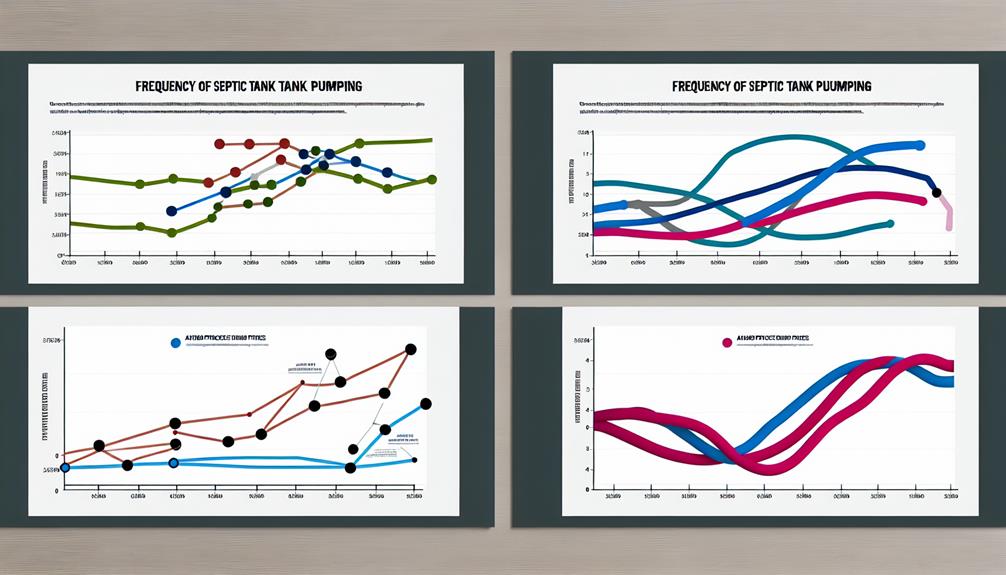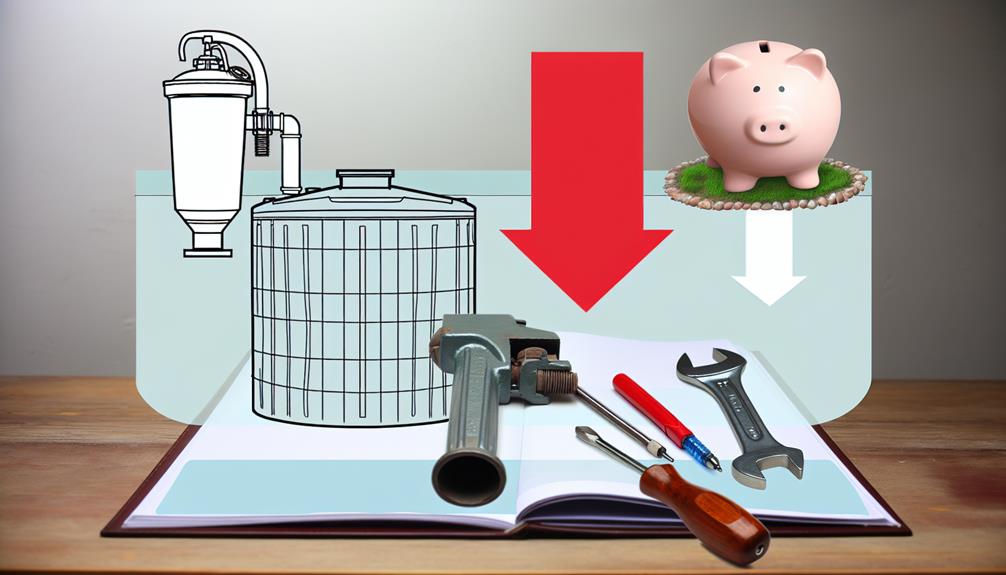Discover how to protect your septic system from breakdown with...
Read MoreYou & Your Septic Tank
Average Prices & Frequency for Septic Tank Pumping
Our professional septic service team offers comprehensive septic tank pumping services to keep your system running smoothly. Get a FREE Quote Today.

Average Prices & Frequency for Septic Tank Pumping
Imagine, you’ve just moved to a rural house and, for the first time, you’re responsible for a septic tank. You’ve heard it can be a pricey and frequent necessity to pump it, but you’re not sure what to expect.
The cost of pumping a septic tank can indeed vary significantly, influenced by factors such as the size of your tank, your geographical location, and the frequency of pumping. However, neglecting this essential task can lead to even more costly repairs or replacement down the line.
So wouldn’t you want to know more about average prices and the recommended frequency for septic tank pumping?
Key Takeaways
- Costs for septic tank pumping can vary based on factors such as tank size, condition, and location.
- Regular maintenance and pumping are important to prevent environmental damage, fines, and costly replacements.
- DIY methods and conservation practices, such as reducing water usage and installing water-efficient fixtures, can help reduce pumping expenses.
- Comparing prices from different service providers, seeking recommendations, and scheduling off-peak appointments can help save money on septic tank pumping services.
Understanding Septic Tank Pumping Costs

So, how much can you expect to pay for septic tank pumping? It’s a common question, but there isn’t a one-size-fits-all answer. Costs can vary, largely influenced by the size of your tank, the condition it’s in, and your geographic location. On average, you’re likely to shell out between $200 to $500 for a typical septic tank pumping procedure.
Understanding the pumping procedures can help in cost negotiation. A typical procedure involves a professional coming to your property, locating and accessing your septic tank, pumping out the waste, and disposing of it in a safe and legal manner. If your septic tank hasn’t been maintained regularly, there may be additional costs for unclogging or repairing it.
Cost negotiation is key. Some professionals may offer discounts for routine maintenance or for homeowners who can locate and dig out their septic tank lid themselves. It’s also worth asking about any additional fees that may be tacked on, such as disposal fees or charges for emergency services.
Factors Influencing Pumping Prices
You’ll find that septic tank pumping prices aren’t uniform across the board.
Factors like regional cost variations, tank size, and additional maintenance or repair needs can significantly influence the final price.
Up next, we’ll break down how each of these factors can impact your septic tank pumping cost.
Regional Cost Variations
Depending on your location, the cost of septic tank pumping can vary significantly due to several factors. Economic influences play a role as regions with a higher cost of living typically have higher service costs. Climate impact is another factor, as areas with harsh weather may require more frequent or specialized services, increasing costs.
| Region | Economic Influences | Climate Impact |
|---|---|---|
| High Cost of Living Area | High service costs due to increased labor and operational expenses | Harsh weather may require more frequent or specialized services, adding to costs |
| Low Cost of Living Area | Lower service costs due to lower labor and operational expenses | Mild weather may lead to less frequent service needs, reducing costs |
| Average Cost of Living Area | Moderate service costs | Average weather conditions may lead to typical service frequency and costs |
Tank Size Impact
The size of your septic tank significantly influences the pumping prices, with larger tanks typically requiring more time and resources to pump. There are several reasons for this:
- Tank Size: A larger tank holds more waste, requiring more labor and equipment to pump out. This increases the overall time and cost of the job.
- Tank Longevity: If maintained well, larger tanks can last longer, reducing the frequency of pumping and long-term costs.
- Installation Expenses: Larger tanks can be more expensive to install, but they can also save money in the long run by reducing the frequency of pumping.
Maintenance and Repair Costs
Aside from tank size, regular maintenance and repair work significantly shape the overall cost of septic tank pumping.
Engaging in DIY maintenance can help you reduce these costs. By routinely checking your system for issues, you can identify potential problems early and prevent costly emergency repairs down the line.
However, not all maintenance tasks are DIY-friendly. Complex jobs require the expertise of professionals, which can add to your expenses.
In case of emergency repairs, you’re looking at even higher costs. These repairs are typically urgent and necessitate immediate attention, thus carrying a premium.
Therefore, maintaining your septic tank regularly and addressing small issues promptly can help you control pumping prices and avoid hefty repair costs.
Regional Variations in Pumping Costs
You’ll find that septic tank pumping costs can vary significantly from one region to another due to factors such as local regulations, transportation costs, and competitive market conditions. Pumping equipment advancements have led to more efficient processes, but they also come with higher upfront costs that can influence regional pricing. Seasonal pricing impact may also play a role, as demand for services could increase during certain times of the year, leading to higher costs.
Consider these three factors that can affect regional pumping costs:
- Local Regulations: Each region has its own rules and requirements for septic tank maintenance. These regulations can influence the cost of pumping, as companies need to comply with local standards and permits.
- Transportation Costs: The distance between your home and the pumping company can impact the final cost. If you live in a remote area, transportation costs may increase the price of services.
- Competitive Market Conditions: The number of septic tank pumping companies in your region can also influence prices. More competition generally results in lower costs, while fewer service providers can lead to higher prices.
Frequency and Cost Relationship

While regional factors significantly impact the cost of septic tank pumping, it’s equally crucial to understand how the frequency of these services relates to your overall expense. The connection between frequency and cost isn’t always straightforward; it largely hinges on the state of your system and the pumping techniques employed.
If your tank is pumped regularly, it’s more likely to have a longer system lifespan. This is because regular maintenance can prevent severe damage and the need for expensive repairs or replacements. For instance, certain pumping techniques can efficiently remove sludge and scum, reducing the strain on your system and extending its life.
However, this doesn’t mean you should get your tank pumped too often. Excessive pumping can be costly and isn’t always necessary. The frequency of pumping should be determined by factors such as the size of your tank, the number of people in your household, and the amount of wastewater you generate.
In essence, the right balance between cost and frequency can save you money in the long run. It’s all about maintaining your system effectively and employing the right pumping techniques. If done right, you’ll not only reduce your expenses but also prolong the lifespan of your septic system.
Cost Comparison: Pumping Vs Replacement
Comparing the costs of regular septic tank pumping to complete system replacement can provide a clear perspective on the importance of routine maintenance. Regular pumping not only ensures the longevity of your septic system but also substantially lessens the financial burden over time.
The cost difference between these two options can be broken down into three key factors:
- Replacement Timeline: A well-maintained septic system can last 20-30 years. Without regular pumping, however, you may find yourself facing replacement in as little as 15 years. The cost of replacement can range from $3000 to $7000, a significant expenditure compared to the average $200-$300 for pumping.
- Maintenance Costs: Regular pumping costs can add up over the years, but these are minor when compared to the costs of a premature replacement.
- Environmental Influence: Neglected tanks can leak, causing environmental damage and incurring fines. Regular pumping mitigates this risk, preserving both your local environment and your wallet.
Ways to Reduce Pumping Expenses

Given the importance of regular septic tank maintenance and the potential costs associated with replacement, it’s worth exploring how you can effectively manage and even reduce these pumping expenses.
One effective way is to adopt DIY methods. Gather information about your septic system, learn about its working principles, and how to handle minor troubleshooting issues. However, remember that professional help is necessary for major problems.
Implementing conservation practices is another way to reduce pumping expenses. By reducing water use, you can limit the amount of waste flowing into the septic system, thus minimizing the need for frequent pumping.
Here is a table summarizing some strategies:
| Strategy | Description | Potential Savings |
|---|---|---|
| DIY Methods | Learn basic maintenance and simple repairs | Variable |
| Conservation Practices | Reduce water use, limit waste to septic | High |
| Regular Maintenance | Prevents major issues and expensive repairs | High |
| Competitive Pricing | Compare prices from different service providers | Variable |
| Off-peak Scheduling | Schedule services during non-peak times | Low to Medium |
Conclusion
In conclusion, understanding septic tank pumping costs can save you a significant amount over time.
Did you know that the average cost of pumping a septic tank is $375, while replacing one can cost up to $5,000?
Regular maintenance, understanding regional cost variations, and knowing the frequency of pumping can help you avoid the hefty replacement expense.
So, investing in regular pumping and maintenance is definitely worth your while.
You may also like...
Why Are DIY Fixes Essential for Septic Tank Pumping?
Tap into the importance of DIY fixes for septic tank...
Read MoreUnveiling the Average Costs of Septic Tank Pumping
Master the mysteries of septic tank pumping costs and avoid...
Read More
The Best Septic Tank Pumping Services Near You

Answer Some Questions
Let us know about your needs so we can find you the right septic tank pros.

Get Quotes
We will put you in touch with the right septic tank pros for your job and location.

Hire Right
Compare quotes, message or call pros, and hire only when ready.



